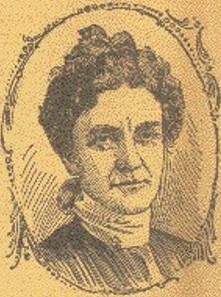Introduction to Sarah Kemble Knight by Brenna Boschetto
Sarah Kemble Knight (1666-1727)
by Brenna Boschetto
Sarah Kemble Knight was one of the pioneering feminists in the colonial period of American settlement. A woman of courage and dedication, she greatly influenced the feminist and literary movements of the future. Her accomplishments as an adventurer and nurturer are what set her apart. Her journal gives readers insight into what life as a woman, mother, educator and adventurer was like in the turn of the 17th century.

She was born on April 19, 1666 in Charleston Massachusetts. The literacy rates in colonial America were reaching heights almost as high as they are now, (Connecticut history) thanks to people like Knight who sought to educate the youth. With her husband, Richard Knight, she ran a writing school and stationary shop where she let her pupils reside in if need be. As well as providing shelter and education she also taught them how to ride horses. It is rumored that Benjamin Franklin was one of her pupils, however there is no hard evidence of this.
Knight was as adventurous as she was compassionate. In October of 1704, she set off on a solo trip from Boston to New York. She opted out of being completely solo during her travels and was always accompanied by another traveler or guide. Still, traveling without a group of people known to you in that era was almost unheard of, especially for a woman on horseback. A lot of psychical and mental strength was needed to endure such dangerous conditions without the guarantee of shelter or sustenance.
Colonial America was very unexplored at this time. The streets had markers nor lights. Google Maps wasn’t around for a good 350 years so she depended help from her compass, travelers and locals for the entirety of her journey. “The roads all along this way are very bad, encumbered with rocks and mountainous passages, which were very disagreeable to my tired carcass.” Here she describes the rough terrain. Bostonian woodlands pre-industrialism was probably pretty intimidating. A great deal of psychical and mental strength is needed to endure such a feat; “But after about eight miles riding, in going over a bridge under which the river ran very swift, my horse stumbled and very narrowly ’scaped falling over into the water” Knight implored a very witty and dry sense of humor in her writing, which she used to face of her very real fears during this journey. “We went on with a moderate pace which made the journey more pleasant” she wrote after the passage above. It seems like she took on a positive outlook and got on with some good old fashioned character building.
Most women during the 17th century never got to experience life outside of their colony. Her work shows insight into life in all of the colonies she passed through. Most settlers in each colony came from the same place with the same cultural customs. This created subcultures and colonial barriers within the country. Knight’s journal gives intel on how different the ideologies, religious views, architecture and cuisine was in the different colonies. This created a very diverse yet disconnected country at the start. “We may observe here the great necessity and benefit both of education and conversation; for these people have as large a portion of mother wit,” Here she places importance on casual and funny exchanges between members of society. This sounds like it came from her inner teacher. She sought out limited togetherness of future America.
Sarah Knight’s altruistic qualities only go so far. The togetherness was limited due to racist prejudices. These began to show as she encountered more Native Americans along the road. She was exceptionally critical of them, stating that they were “the most salvage of all the salvages of that kind that [she] had ever seen” She believed that “little or no care taken to make them otherwise,” and that the cultural assimilation needed was not happening. These comments give insight to the grim reality of how bigoted and extremely disrespectful the majority of settlers were to anyone with a darker shade of skin. Though this racism is disconcerting to readers, it is important to realize how many otherwise decent people were indoctrinated into adopting white supremacy, which was the norm of the era.
Though there were a lot of great minds in the Academia, some of those minds were not as forward thinking as their peers. The war of equality is still being fought today. I do not intend on criticizing her oh her beliefs in this essay as I could go on forever; probably divulging into how cultural bigotry such as hers is still seen in America today. Her otherwise compassionate soul and beautiful literary works influenced the future generation of writers during the era of the founding fathers. Racial bias aside, Knight was a very important woman in the history of America.
Essay Questions:
What remnants of early settlers’ racial beliefs and attitudes are left in America today?
How do you think literature like this influenced the next generation of Americans?
How much did Knight’s racist ideologies effect your impression of her literary works?
Text included with the permission of the author.
Image: Public Domain

